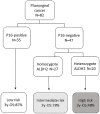Prognostic value of ALDH2 polymorphism for patients with oropharyngeal cancer in a Japanese population
- PMID: 29206831
- PMCID: PMC5716598
- DOI: 10.1371/journal.pone.0187992
Prognostic value of ALDH2 polymorphism for patients with oropharyngeal cancer in a Japanese population
Abstract
Background: Half of Japanese possess a polymorphism of aldehyde dehydrogenase 2(ALDH2), while few white individuals possess this mutation. The purpose of this study was to investigate the possibility of ALDH2 polymorphism as a prognostic factor for oropharyngeal cancer (OPC) among Japanese population.
Methods: We analyzed 82 Japanese patients with OPC treated between 2006 and 2011. The median observation period was 50 months. P16-staining and ALDH2 polymorphisms were investigated. To examine the frequencies of second primary pharyngeal and esophageal cancers (SPPEC),37 Japanese patients with OPC treated at Tokyo University Hospital were included for statistical analysis.
Results: Statistically significant differences were noted in OS among sex, age, N classification, and p16 (p = 0.045, 0.024, 0.020, 0.007, respectively). In addition, OS and DSS rates of the patients with heterozygous ALDH2 tended to be worse than those of the patients with homozygous ALDH2 (p = 0.21, 0.086, respectively). Of note, OS and DSS of the patients with p16-negative OPC and heterozygous ALDH2 was significant poorer than those of the patients with p16-positive OPC (p = 0.002, 0.006, respectively), while there was no significant difference in OS and DSS between patients with p16-positive OPC and patients with p16-negative OPC and homozygous ALDH2.
Conclusions: ALDH2 polymorphism might be a promising prognostic factor for Japanese patients with p16-negative OPC.
Conflict of interest statement
Figures





Similar articles
-
Detailed Analysis of Clinicopathologic Factors Demonstrate Distinct Difference in Outcome and Prognostic Factors Between Surgically Treated HPV-Positive and Negative Oropharyngeal Cancer.Ann Surg Oncol. 2015 Dec;22(13):4411-21. doi: 10.1245/s10434-015-4525-0. Epub 2015 Mar 24. Ann Surg Oncol. 2015. PMID: 25801358 Free PMC article.
-
Multiple cancers associated with esophageal and oropharyngolaryngeal squamous cell carcinoma and the aldehyde dehydrogenase-2 genotype in male Japanese drinkers.Cancer Epidemiol Biomarkers Prev. 2002 Sep;11(9):895-900. Cancer Epidemiol Biomarkers Prev. 2002. PMID: 12223435
-
Helicobacter pylori, chronic atrophic gastritis, inactive aldehyde dehydrogenase-2, macrocytosis and multiple upper aerodigestive tract cancers and the risk for gastric cancer in alcoholic Japanese men.J Gastroenterol Hepatol. 2007 Feb;22(2):210-7. doi: 10.1111/j.1440-1746.2006.04377.x. J Gastroenterol Hepatol. 2007. PMID: 17295873
-
[Alcohol and oropharyngolaryngeal and digestive tract cancer].Nihon Arukoru Yakubutsu Igakkai Zasshi. 2001 Dec;36(6):551-66. Nihon Arukoru Yakubutsu Igakkai Zasshi. 2001. PMID: 11828713 Review. Japanese.
-
Association between ALDH2 Glu487Lys polymorphism and the risk of esophageal cancer.Medicine (Baltimore). 2017 Apr;96(16):e6111. doi: 10.1097/MD.0000000000006111. Medicine (Baltimore). 2017. PMID: 28422823 Free PMC article. Review.
Cited by
-
Oncological Outcomes of Concurrent Chemoradiotherapy and Surgical Treatment for Patients With T3 Hypopharyngeal Cancer: A Single-Center Retrospective Analysis.Cureus. 2024 Jun 17;16(6):e62553. doi: 10.7759/cureus.62553. eCollection 2024 Jun. Cureus. 2024. PMID: 38894937 Free PMC article.
-
The role of ALDH2 in tumorigenesis and tumor progression: Targeting ALDH2 as a potential cancer treatment.Acta Pharm Sin B. 2021 Jun;11(6):1400-1411. doi: 10.1016/j.apsb.2021.02.008. Epub 2021 Feb 11. Acta Pharm Sin B. 2021. PMID: 34221859 Free PMC article. Review.
-
Comprehensive Analysis of Aldehyde Dehydrogenases (ALDHs) and Its Significant Role in Hepatocellular Carcinoma.Biochem Genet. 2022 Aug;60(4):1274-1297. doi: 10.1007/s10528-021-10178-0. Epub 2021 Dec 20. Biochem Genet. 2022. PMID: 34928471 Free PMC article.
-
ALDH2 dysfunction and alcohol cooperate in cancer stem cell enrichment.Carcinogenesis. 2024 Feb 12;45(1-2):95-106. doi: 10.1093/carcin/bgad085. Carcinogenesis. 2024. PMID: 37978873 Free PMC article.
-
Alcohol Consumption, ALDH2 Polymorphism as Risk Factors for Upper Aerodigestive Tract Cancer Progression and Prognosis.Life (Basel). 2022 Feb 27;12(3):348. doi: 10.3390/life12030348. Life (Basel). 2022. PMID: 35330099 Free PMC article. Review.
References
-
- Ji YB, Tae K, Ahn TH, Lee SH, Kim KR, Park BL, et al. : ADH1B and ALDH2 polymorphisms and their associations with increased risk of squamous cell carcinoma of the head and neck in the Korean population. Oral Oncology. 2011;47: 583–7. doi: 10.1016/j.oraloncology.2011.04.007 - DOI - PubMed
-
- Oze I, Matsuo K, Suzuki T, Watanabe M, Hiraki A, Ito H, et al. : Impact of Multiple Alchohol Dehydrogenase Gene Polymorphisms on Risk of Upper Aerodigestive Tract Cancers in a Japanese Population. Cancer Epidemiol Biomarkers Prev. 2009;18:3097–3102. doi: 10.1158/1055-9965.EPI-09-0499 - DOI - PubMed
-
- Yokoyama A, Omori T, Yokoyama T: Alcohol a d Aldehyde Dehydrogenase Polymorphisms and a New Strategy for Prevention and Screening for Cancer in the Upper Aerodigestive Tract in East Asians. Keio J Med. 2010;59:115–130. - PubMed
-
- Chaturvedi AK, Engels EA, Pfeiffer RM, Hernandez BY, Xiao W, Kim E, et al. : Human Papillomavirus and Rising Oropharyngeal Cancer Incidence in the United States. J Clin Oncol. 2011;29:4294–4301. doi: 10.1200/JCO.2011.36.4596 - DOI - PMC - PubMed
-
- D’Souza G, Kreimer AR, Viscidi R, Pawlita M, Fakhry C. Koch WM, et al. Case-Control Study of Human Papillomavirus and Oropharyngeal Cancer. N Engl J Med.2007;356:1944–1956. doi: 10.1056/NEJMoa065497 - DOI - PubMed
MeSH terms
Substances
LinkOut - more resources
Full Text Sources
Other Literature Sources
Miscellaneous

